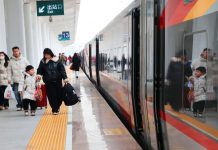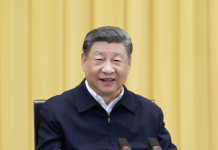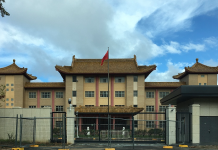Eight years ago, following college graduation, Cui Jiuxiu, born in Juxian County, Shandong Province in east China, set off for Xinjiang Uygur Autonomous Region in the country’s northwest to pursue her dream—to become a public servant and help locals in underprivileged areas improve their lives.
Today, Cui is deputy secretary of the Communist Party of China (CPC) of Opal Township Committee in Kashgar, Xinjiang. Over the years, she has witnessed local people climbing out of extreme poverty by setting up rural cooperatives, manufacturing workshops or even clothing design studios. They use advanced technology to grow vegetables, breed crops and manage greenhouses, with fruits and vegetables grown in the area now sold across the country.
“I spent the best years of my youth in Xinjiang; it is because of this choice and because of Xinjiang that I lead a very different life,” Cui said.
Shaking things up
At the foot of the Pamir Plateau, Opal is home to fruit cultivation, forestry and farming. However, limited arable land and a dry climate meant villagers’ farming efforts previously yielded little profit. The national anti-poverty campaign brought more farming technologies and applications as well as rural tourism to the area, lifting residents’ living standards.
Cui is one of the pioneers who educate farmers about new ways to increase their yield and cultivate new channels for employment. “I can see with my own eyes how life in rural Xinjiang is on the up,” she added.
Enterprise-enabled poverty alleviation is one practical measure to increase local incomes. For example, two leading local companies rented the land use rights from several farmers and established a field for seed breeding plus fruit and vegetable planting near Kashgar to develop protected agriculture, cultivating high-value vegetables and other horticultural greenhouse crops. China’s land ownership rights belong to the state or farmer collectives; individual farmers have the right to use the land.
Farmers can earn money from leasing their land and simultaneously have time to work in the cities—getting a better paycheck. But if they wish to stay put, the companies can offer them greenhouse employment. “Farmers can earn way more than before, even during the off season,” Cui, as a local official who facilitated communication between various parties and promoted the overall process, said.
Cui now considers developing tourism in Opal, a place many from across China must pass through en route to the Pamir Plateau, which lies between Central Asia, South Asia and East Asia. In the past, the area featured only a handful of restaurants for travelers to make a pit stop.
After extensive field investigation, Cui believes the township can develop a type of culture-oriented tourism which introduces regional cuisine, handicraft and other specialties with unique ethnic minority flavors to more travelers, in turn boosting local employment and livelihood.
Cui visited households and collected villagers’ concerns and suggestions on shop decorations and rental rates. She also contacted various companies, seeking opportunities for collaboration.
“Xinjiang’s produce, natural scenery and cultural heritages should become more widely known,” she said.
Deputy on duty
Cui is also a deputy to the 13th National People’s Congress (NPC), China’s national legislature. She recently attended the annual legislative session that concluded in Beijing on March 11.
Deputies to the NPC collect people’s opinions and bring these to the annual NPC session so they may be incorporated into laws and policies. This process constitutes a smooth conduit for addressing the people’s needs, Cui told Beijing Review.
“Many people may not know what NPC deputies do. People can talk to us about any concerns or opinions they might have. If these are reasonable and legal, we will write them down and submit them to the NPC, which will then take up the issues with the relevant government departments,” Cui said. Many of her suggestions have addressed topics like rural revitalization and tourism to boost local incomes.
During this year’s NPC session, Cui and other deputies together reviewed government work report drafts and offered advice on revisions. They also attended various meetings and conducted discussions on the issues they spotted whilst “out in the field.”
Following the conclusion of the Fifth Session of the 13th NPC, Cui swiftly returned to her duties as a town official, while also continuing her work as a deputy.
In Opal Township, there is a liaison station where NPC deputies regularly work and wait for people to communicate their concerns and suggestions. After problems are collected, deputies will begin investigating through research, field visits and further talks with the community, and then produce a formal document with issues and suggestions for submission to the NPC.
After the NPC receives the documents, it will transfer each suggestion to the relevant government body, which will provide feedback to the deputy who proposed it. “How long government organizations take to provide their reply varies, but all suggestions will receive a response,” Cui said.
Cui is also exploring more innovative ways to gather public opinion, for example by posting vlogs on social media so that more people will know the NPC deputies stand ready to hear from them.
One of the suggestions she made this year came to her via WeChat, one of China’s largest multi-purpose social media platforms. An acquaintance learned from her post that she was leaving for Beijing to attend the NPC session and he spoke to her about his confusion regarding children airfares.
According to current regulations, plane tickets for children are charged at 50 percent of the regular adult fare, but many adult fares, after discounts, are well under that half-price. “So, in reality, people might pay more for children than for adults, and that cannot be the original intention,” Cui said. She took the matter up with the Civil Aviation Administration of China and now awaits their reply.
“There are many deputies countrywide. Each connects with some households. Like this, all households can be covered and they’ll always have a deputy to reach out to. This is exactly what whole-process people’s democracy really means,” Cui said.
“No matter what they think in other countries, if we implement this system properly, we are guaranteeing that the people are the masters of their country,” Cui added. -The Daily Mail-Beijing Review News Exchange Item





